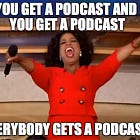🎙 Do you miss podcasting? Part One
As a deeply rewarding hobby, yes. As a business I was trying to “go pro” in, no.
After nine years of publishing my Pivot podcast and three for Free Time in parallel, at this time last year I made the tough decision to pause both shows in February. I needed more free time (heh) and emotional space, and I could no longer sustain the production costs without a steadier stream of speaking engagements. It was time to put the trophies away.
In the following months, a handful of friends and listeners have asked how it feels to have stopped the shows. “Do you miss podcasting?” they ask kindly.
There are aspects that I miss for sure:
Regularly connecting with bright, interesting people; immersing myself in their books and body of work beforehand;
A perfect introvert-friendly method for making new friends, catching up with old ones, and reaching out to people I admire;
Having deep, enriching one-to-one conversations on a daily basis;
(Hopefully) positively impacting listeners by brightening their day or making their lives and work a little easier;
Challenging myself to come up with weekly solo episodes, surprising myself when I did;
The format and forum for putting out ongoing public, original thinking consistently week after week, especially since I’m not on social media; and
Being able to quickly and easily say yes to helping someone when something exciting is on the horizon, like a book launch.
What I don’t miss:
The growing pressure to produce episodes on video and when interviewed, clips for social media (I would often tell guests, “I have a personality for podcasting” before giving us both permission to relax and record with video turned off), and
Failing to fund it; swimming in the “red ocean” of growing competition, particularly from celebrities and corporations (even they are struggling with profitability).1
Although I truly loved the activities involved in podcasting, I mistakenly and naively thought if I doubled down on my zone of genius—in Gay Hendricks’ parlance, on something I loved and that others said I was talented at—“going pro” would work.
It didn’t.
When trying to turn podcasting into my full-time gig, as was my goal when launching Free Time in early 2021, and as some of my close friends had successfully done, I became unknowingly part of the aspirational labor class. This is a term coined by Cornell communications professor Brooke Erin Duffy in her 2017 monograph, (Not) Getting Paid to Do What You Love.2
In the concluding chapter, Duffy writes about part-time flexitariat workers, a play on the economic class dubbed the precariat in 20143 (line breaks and emphasis mine):
“Aspirational labor is both propelled and sustained by the promise of a better future—with a fulfilling career where pleasure, passion, and profit meld. But does it pay off?
In a handful of cases, these aspirational activities do provide laborers with economic and social capital. The success stories of social media celebs gaining entrée into the fashion, photography, or publishing circuits reaffirm the rewards of aspirational labor: while some are making a living from their passion projects, others have been hired into a traditional creative industry.
Yet these tales of achievement should not obscure the practical realities of aspirational work. Only a handful have been able to realize their dreams of “going pro,” and those who have toil around the clock to maintain their self-starter careers. We might conclude that aspirational labor doesn’t pay off—if the benchmark is merely financial compensation. But aspirational labor has succeeded in one important way; it has glamorized work just when it is becoming more labor-intensive, individualized, and precarious.”
While I do miss the more life-giving elements of podcasting, I don’t miss the feeling of being in over my head in exactly these ways.4
❤️
Continue reading part two for more on what that felt like . . .5
Red ocean refers to a term from the popular business book, Blue Ocean Strategy: How to Create Uncontested Market Space and Make the Competition Irrelevant. From the website:
Red oceans are all the industries in existence today – the known market space, where industry boundaries are defined and companies try to outperform their rivals to grab a greater share of the existing market. Cutthroat competition turns the ocean bloody red. Hence, the term ‘red’ oceans.
Blue oceans denote all the industries not in existence today – the unknown market space, unexplored and untainted by competition. Like the ‘blue’ ocean, it is vast, deep and powerful – in terms of opportunity and profitable growth.
For more on even well-funded corporations struggling to monetize their shows, see Adam Davidson’s article about the depressing state of the podcasting industry—one in which the ;TLDR seems to be that only celebrity shows pencil out. In the back of my mind, I knew ‘dis.
Big thanks to for putting this book on my radar in her wonderful article, “The Always-Deferred Promise of Exposure.”
UK economist Guy Standing introduced the term precariat to classify a growing group of workers. Here’s an expanded definition from our AI friends at Google:
The term precariat is a combination of the words “precarious” and “proletariat,” essentially meaning a social class characterized by a precarious or unstable work situation, and was popularized by British economist Guy Standing in his 2014 book, The Precariat: The New Dangerous Class, where he describes this emerging class with a lack of job security and social guarantees; essentially, a modern “working class” facing extreme instability in the labor market.
Even though I still am, for different but reasons 🙃











Certainly I miss the podcasts, especially the solo ones most of all. It was comforting to hear Jenny’s voice and listen to her thoughts once a week. I learned so much about the real trials and tribulations of publishing when Jenny gave us an unprecedented view of the genesis of Free Time. Jenny, please know how much you mean to your subscribers.
What would it look like to be able to reach out and have those same conversation with folk without the pressure of it being a product, or feeling like they needed a return on their time investment?